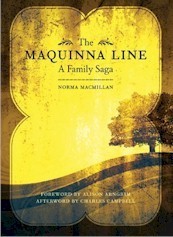A voyage up north with Norma MacMillan's The Maquinna Line
 I'm not sure where I first came across The Maquinna Line. It may have been while browsing Amazon.ca, or I could have spotted it on a website dedicated to Hollywood personalities. Norma MacMillan's family saga has an unusual story behind it. Called the author's "lost novel," the manuscript was pulled out of a closet a few years after her death in 2001. Her husband and friends worked to find it a publisher, and it finally appeared in print last year.
I'm not sure where I first came across The Maquinna Line. It may have been while browsing Amazon.ca, or I could have spotted it on a website dedicated to Hollywood personalities. Norma MacMillan's family saga has an unusual story behind it. Called the author's "lost novel," the manuscript was pulled out of a closet a few years after her death in 2001. Her husband and friends worked to find it a publisher, and it finally appeared in print last year.MacMillan, a noted actress in her day, was known for her role as the voice of Casper the Friendly Ghost. Folks from my generation may be more apt to recognize the name of her daughter, Alison Arngrim, famous for playing that nasty wench Nellie Oleson on Little House on the Prairie.
Ms. Arngrim wrote the forward to her mother's book, describing her enthusiasm for writing, the times she left LA on mysterious research trips to the wilds of Nootka Island, and the subject of the book itself, which she found dark, peculiar, and a little disturbing. It wasn't the type of book her mother's upper-crust Vancouver family would have approved of.
Fortunately, the novel stands well on its own without the celebrity association. The Maquinna Line is a classic generational saga in the tradition of James Michener and Edward Rutherfurd. It has a good sense of place and history, though its greatest focus is on its characters and how the social strictures of the time pressure them and determine their choices. Their lives turn out differently than they plan, and their trials and misfortunes make for very entertaining reading.
The main narrative begins in 1910 and continues through the end of WWII, and occasional flashbacks bring us back to earlier periods. Vancouver Island during the Edwardian era offers a mix of cultures, all well represented in the tale. An Icelandic entrepreneur opens a fancy hotel on a private island, promotes it as a tourist attraction, and raises his daughter there. An upwardly mobile couple brings an Indian chief's daughter, a descendant of the 18th-century Chief Maquinna, to live with them as their maid; her cold yet exotic beauty proves irresistible to the area's young men. And an adolescent boy commits a moral transgression he doesn't fully understand, one which destroys the peace in his socially conscious family.
Victoria, British Columbia, at the southern tip of Vancouver Island, is the drama's centerpiece, though it also branches out to include a lumber camp and Moachat village up north as well as other outposts. As the novel implies, the description of the city and its people as Victorian suits them in more than one way (they're called "more English than England").
Norma MacMillan clearly had a passion for the place where she grew up, and she transformed it into a novel I kept wanting to come back to. It packs a lot of story into 276 pages.
The Maquinna Line was published by TouchWood Editions in trade paperback at $19.95 - same price in Canada and the US. For non-Canadians, it's available at a discount on both versions of Amazon, should you so choose.
Published on December 14, 2011 15:00
No comments have been added yet.



